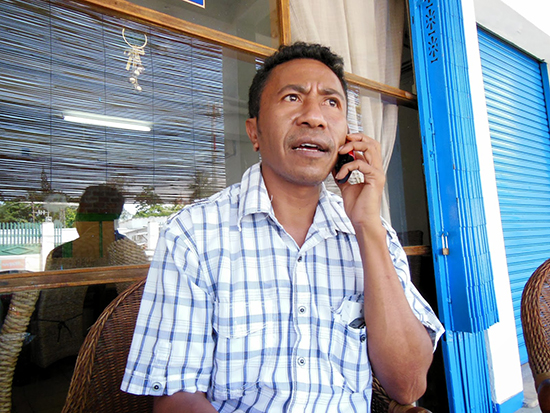
AUCKLAND (Cafe Pacific/Pacific Media Watch): Timor-Leste Press Club has this week transformed itself into the fledgling Timor-Leste Press Union and now seeks to become affiliated to the Brussels-based International Federation of Journalists.
It is also seeking collaboration with the National University of Timor-Leste (UNTL) to establish a training programme for journalists in the industry.
These are just two of the current moves by journalists in response to mounting concern over a proposed media law that some fear may curb a free press in the country.
While journalists are worried about the legislation, some are reluctant to openly condemn it.
Timor-Leste Press Union president Jose Belo, the country’s best known investigative journalist and publisher of the independent Tempo Semanal, has confirmed the new status of his journalists advocacy group and says he is concerned over “government control” of media.
“What I understand from the draft media law is that government will control journalists and media,” he says.
However, media sources say that parliamentary consultation this week has led to some “softening” of the draft law.
Some changes
It is understood the parliamentary committee overseeing review of the bill has agreed to some changes, including “redefining” who will be recognised as journalists.
It was also agreed that a political party could have its own media providing it “follows the laws and rules” applying to media operations
This provision has great significance for Radio Maubere, a long-established radio station run by the opposition Fretilin party.
According to one Timorese media commentator, who declined to be named, among concerns in particular are “avenues for control of media reporting through the proposed Press Council, which will license journalists”.
Journalists would also be required to have “academic qualifications determined by the Press Council”.
International media outlets and their correspondents intending to report from Timor would in future as well as needing to meet migration requirements would also require “authorisation” from the government.
“Overkill?” asks the commentator.
Foreign investment
“Interestingly it allows for foreign investment in media – what some are calling the ‘Indonesian Xanana-supporter friends’ clause,” says the commentator, in an apparent reference to a prominent businessman with television interests in Timor-Leste.
According to Belo, the government designed the law with three main objectives in mind:
• certification of journalists;
• approval of who can be journalists; and
• licensing of the news media
“The draft media law gives excessive power to the proposed Press Council to remove media access to any journalist,” says Belo.
“The Press Council is empowered to punish journalists or media organisations, forcing them to pay fines to the government if they violated any articles in the media law.
“It seems to me the Press Council is likely to be police or prosecutor - even judge - for journalists and media."
Sanctions warning
The international news service Al Jazeera reported recently after a conference of journalists to discuss proposed government changes to media policy that sanctions would be taken against journalists “without credentials”.
Timor-Leste's State Secretary for Communications, Nelio Isaac Sarmento was quoted by the Jakarta Post as saying: "Almost all journalists are young and many [started their jobs] after high school.
“They directly entered professional journalism with only one or two weeks' training. That's not enough."
The Al Jazeera report also cited the dual problems of high illiteracy - above 40 percent - and multiple languages in Timor-Leste
“Portuguese and Tetum are the country's official languages, but about two dozen other languages and dialects are also spoken,” said Al Jazeera.
“Press freedom has improved since the enactment of a penal code in 2009 that decriminalised defamation. Cases of reporters being harassed or attacked, once common, are now rare.”
But leading media personalities fear the draft new law may provide an unscrupulous government with enough legal hurdles to intimidate the media.
- La’o Hamutuk media law page (including links to the draft law)
- Earlier Café Pacific commentary on the media law
This work is licensed under a Creative Commons Attribution-NonCommercial 3.0 New Zealand Licence.




